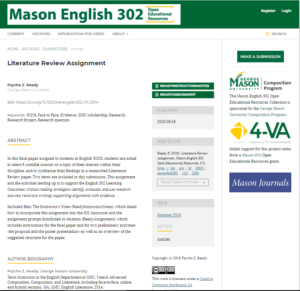One of the mainstays of the 4-VA at Mason program is to identify and grow academic ventures that truly make a difference in higher education – creating cost savings, providing greater access to the educational process, and developing new or more effective pedagogies.
That said, it’s hard to find a more impactful grant than the one supporting ENGH 302: Advanced Composition. This grant was provided to help build an OER collection for this celebrated Mason Core class which has an enrollment of almost 7000 students annually, delivered by a rotating group of approximately 65 faculty.
The challenges were plenty facing Catherine E. Saunders — who teaches the 302 course and has served as coordinator over two stages of the 4-VA@Mason grant project — and thirteen English 302 colleagues who served on the project team. As instructors of an advanced composition course offered at only a few American universities, faculty teaching English 302 did not have access to “off the shelf” textbooks appropriate the specific goals of the course. Instead, most instructors created and/or adapted materials to suit their students’ needs, within an informal culture of sharing, collaboration of various versions of assignments and activities developed within the English 302 instructor community. Moreover, with a growing number of instructors being hired to serve the expanding ranks of English 302 students, there was danger of losing consistency across sections. Saunders sought to formalize the existing culture of collaboration and ensure that resources developed by experienced instructors are easily available to new instructors.
Saunders and a group of colleagues first applied for and received a 4-VA@Mason grant a year prior. That grant provided support for the creation of a core collection of OER items – assignments, activities, and other curricular materials created and peer-reviewed by experienced English 302 instructors – that were then made available to new and experienced English 302 instructors via a Blackboard organization.
The Blackboard-based collection was popular with English 302 instructors. However, follow-up surveys of users revealed room for improvement in design of the collection, as well as a desire for additional resources and a preference for a public-facing collection. A different platform was needed to make OER developed by the English 302 team more readily available not only to GMU faculty, but also to the wider composition community. Hence, the team applied for a second 4-VA@Mason grant to finish the work.
 Team member Psyche Z. Ready, assisted by Joyce P. Johnston, took the lead in adapting Mason Journals’ iteration of the Open Journal System (OJS) to meet the needs of English 302 OER collection authors, reviewers, and users. Each item in the new, public-facing collection includes an abstract, instructor’s notes, and creative-commons licensed curricular materials – assignments, activities, and/or background readings – created, adapted, or curated for use in English 302. The OJS platform eases the review process, and also allows user-friendly features such as keyword searching.
Team member Psyche Z. Ready, assisted by Joyce P. Johnston, took the lead in adapting Mason Journals’ iteration of the Open Journal System (OJS) to meet the needs of English 302 OER collection authors, reviewers, and users. Each item in the new, public-facing collection includes an abstract, instructor’s notes, and creative-commons licensed curricular materials – assignments, activities, and/or background readings – created, adapted, or curated for use in English 302. The OJS platform eases the review process, and also allows user-friendly features such as keyword searching.
The response from the instructors and students alike has been rewarding for Saunders and her team of developers. “The students do express appreciation that course materials are free to them and that they are specifically adapted to the goals of the course,” Saunders says. “They also like that the materials break down larger concepts and assignments into manageable chunks, and that they employ active learning strategies and real-world materials.”
Saunders and Ready have recently brought their project to a larger audience, presenting their work at the Northeast Modern Language Association conference, with plans for other conference presentations in progress.
In addition to Saunders, Ready, and Johnston, the ENGH 302 team included the following faculty members: Lourdes Fernandez, Virginia Hoy, Sara King, Stephanie Liberatore, Jessica Matthews, Benjamin D. Orlando, Mark Rudnicki and Margaret Scolaro. Saunders also credits the “invaluable assistance” of Fenwick Library staff, John Warren, Aaron McCollough and especially Andrew Kierig.
To see their site, click here.
